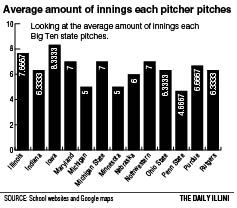Illinois baseball protecting its most valuable assets
Mar 18, 2015
Drew Dickinson knew that the Illinois baseball team’s pitching staff would be good this season. With 16 pitchers returning and only three leaving, the pitching coach recognized the staff would be dominant — a rare occurrence in college baseball.
The 35-year-old former Illini pitcher, who is tied for the school record in wins, wasn’t omniscient of everything about his group of hurlers, though. During the first two weeks of the season, he was caught off guard, surprised to see how sharp the staff was. There were no early-season hiccups; his group was ready to make this season historic.
“Usually it takes us a couple of weeks to find that grove,” Dickinson admitted. “I was just surprised at the execution level that early in the season.”
Through the first 19 games of the season, the Illinois pitchers have lived up to the hype. The staff boasts the nation’s best WHIP (0.91) and walks per nine innings pitched (1.63), the second-best strikeout to walk ratio (4.81) and the fifth-lowest ERA (1.95).
Although the Illini have experienced early-season success, the goal for Dickinson and the rest of the Illinois coaching staff is to find a way to sustain the achievements for the rest of the season and postseason. Dickinson believes he’s found that formula.
Get The Daily Illini in your inbox!
The magic number is 100.
The coaching staff, in the dugout and behind home plate, keeps track of pitching count and innings thrown. It makes sure each starter doesn’t throw too many pitches over 100. Dickinson has determined 100 is the perfect number for his staff to make sure that the pitchers are fresh and arms are getting stronger.
“If (a starter’s) pitch count is between 75-100 pitches, he’s not being worked at all, he’s actually strengthening his arm,” Dickinson said. “If I took a week off, if I don’t throw for two weeks and I throw 100-150, that’s not good for your arm because it’s too much and too less, there has to be an even keel.”
According to Dickinson, gameday should be the easiest day for his pitchers. The goal is to throw the ball every day. Although not every day is spent throwing off the mound, there still needs to be room for long toss and 90-foot throws.
Two days are spent in the weight room working with the trainer, something other schools have shied away from because of lack of time. The lifting keeps the muscles, specifically in the shoulders and forearms, strong to sustain the grind of a baseball season.
The pitching coach also demands his players run plenty of sprints. He doesn’t believe in distance running, drawing the comparison between the body of a sprinter and that of a long-distance runner. Pitching is full of short bursts and players always need to be on their toes, ready to move at any angle.
All the different elements come together to form the circle that is Dickinson’s system. Each pitcher, even relievers, usually pitches in one game a week, meaning that there isn’t too much stress on each arm, something Dickinson emphasizes. Each arm becomes stronger as the weeks pass, leading to the best performance when it matters the most — the postseason.
“Each start, they should be feeling stronger,” Dickinson said. “The more you throw, the more your arm strengthens … With the programs that we do, our guys are at their strongest when other teams are tethering out.”
The lone problem the Illinois pitching staff faces is finding innings for everyone. Most of the starters have lasted at least seven innings into each start with just a few exceptions so far this season. When the starter is done, it’s usually junior closer Tyler Jay’s job to seal the win and earn a save.
With the limited opportunities available for pitchers in the bullpen, the coaching staff has to become creative. Those with limited opportunities will get a chance to throw a bullpen session or a quick three-inning scrimmage just to stay sharp. It doesn’t matter if a pitcher hasn’t pitched in a game for two weeks, when his number is called, it’s time to take advantage.
Few coaches would complain of having pitching depth — deep bullpens usually lead to World Series titles, in college and in the pros — and head coach Dan Hartleb knows he’s lucky.
“I’ve been on teams that don’t have starters or depth,” Hartleb said. “Just to have this group — a group that’s confident, really understands how to pitch and what they’re doing — is a blessing. You can go an entire career and never have a staff like we have.”
There are things that will be out of Dickinson’s control. Injuries happen all the time, especially to pitchers. So far his staff is healthy and his goal is to make sure that it stays that way, without any surprises.
“As a competitor, you want to be out there as much as you possibly can,” junior starter Kevin Duchene said. “I have full confidence that Drew has our best interest in his mind. This is what we train for all winter long, and we train to sustain that strength for the whole season.”
@mdwojak94






